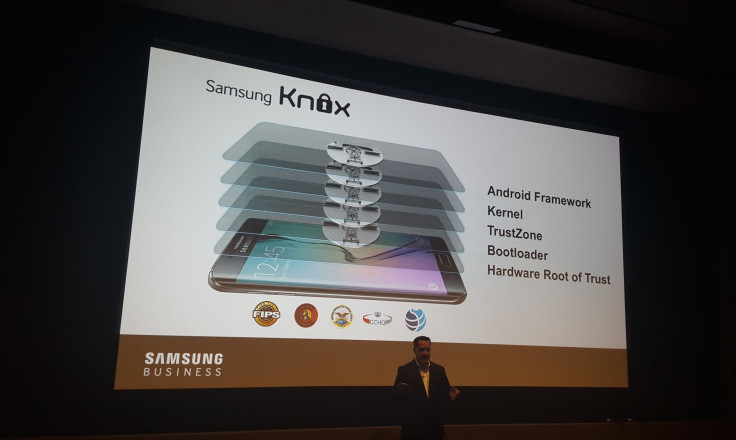Samsung’s Galaxy Note 5 and Galaxy S6 Edge+ flagships will officially hit stores Friday. But if you are a Verizon or AT&T subscriber who is used to rooting smartphones, beware. Rooting these carrier models of the Galaxy Note 5 and Galaxy S6 Edge+ will shut down your phone completely.
The Verizon and AT&T models have a carrier specific mechanism, which is apart of the Samsung Knox Security Suite, Samsung Knox director of business development Ram Motipally detailed to iDigitalTimes at a recent briefing in New York prior to the Galaxy Note 5 and S6 Edge+ launch. “In most of the U.S. devices, if you root the device the device won’t even boot up; if it’s AT&T or Verizon,” he said.
Root prevention has been an on-going aspect of Samsung Knox since it’s inception. In the early days of Knox, rooting a Samsung smartphone could trip a key on a device, which would void the warranty. Root prevention through Knox has been developed to where the rooting Samsung Galaxy S6 or Galaxy S6 Edge handsets will disable the Samsung Pay mobile payment feature. But now, if a Verizon and AT&T variant of the Galaxy Note 5 or Galaxy S6 Edge+ is rooted, users will see only a black screen with a message explaining the device cannot boot up because it has been rooted, Motipally explained.
Other Galaxy Note 5 or Galaxy S6 Edge+ handsets, such as T-Mobile, Sprint and unlocked variants do not include this feature. Rooting would simply disable Samsung Pay as it does on the Galaxy S6 or Galaxy S6 Edge. Root prevention is heavily tied to Samsung’s enterprise push, to get more devices like the Galaxy Note 5 and Galaxy S6 Edge+ in the hands of business users.
Samsung Knox was once a feature introduced to devices through software updates, but it now comes standard on all Samsung smartphones. The software is heavily ingrained within the Android framework and the kernel of Samsung’s devices, Samsung Business vice president, mobile product marketing, Eric McCarty explained at a business launch for the Galaxy Note 5 and Galaxy S6 Edge+ last Thursday.
In particular, Samsung Knox includes a Root of Trust, which dictates what tasks a device can execute with confidence. Some of the functions of a Root of Trust are detecting rootkits and recognizing unauthorized changes to a smartphone’s system or program. This especially speaks to the Verizon and AT&T models of the Galaxy Note 5 and Galaxy S6 Edge+ as Verizon and AT&T are especially adverse to customization of their devices.
The continued implementation of Knox onto Samsung devices has alleviated many concerns about safety in using Android in the enterprise space, Samsung vice president of marketing strategy and operations, Ed Abrams told iDigitalTimes in July. However, this focus on enterprise users could be a detriment to dedicated Android developers or Samsung enthusiasts who are not in love with the TouchWiz user interface.
Android-based smartphones have been popular, largely due to the open source nature of their software and user’ ability to customize devices through rooting. But with Google as one of Samsung's partners for its business sector, users could continue to see root prevention efforts in new and upcoming devices.

















